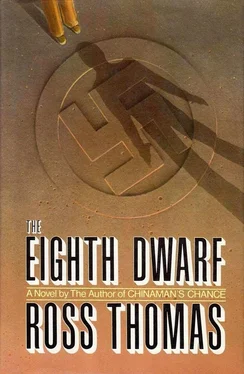“What about him?”
“He was very much interested in politics. He tried to join the Party six separate times and was rejected each time — on the ground of emotional instability.” The butler took one hand off the wheel and tapped his right temple significantly. “Ein sonderbarer Kanz.” A queer customer.
“Not quite right, was he?” Jackson said.
“Not quite. I told the Americans this, naturally. It was my duty.”
“Just as it was your brother-in-law’s duty to inform them about you.”
“Exactly. Regulations must be observed, or where would any of us be?”
“Where indeed?”
“Unfortunately, two months later my brother-in-law went berserk and killed the American who had hired him. Strangled him to death. A captain and a very fine fellow, I thought, even though he did dismiss me.”
“You bore the captain no grudge?”
“Certainly not. He was only abiding by the regulations.”
“Maybe if he hadn’t, he’d still be alive.”
The butler turned the idea over in his mind, then shook his head negatively. “It is probably better not to think about such things.”
“Probably,” Jackson said.
Ten minutes later they were at the address that Leah Oppenheimer had given him in Ensenada at a time that now seemed months ago. The butler hastily got out from behind the wheel and hurried around to Jackson’s door as fast as he could, which wasn’t very fast because he was at least sixty and seemed to suffer from an arthritic right leg.
“What are you called?” Jackson said as he climbed out.
“Heinrich, Herr Doktor.”
“That’s a pretty bad limp you’ve got, Heinrich.”
“I know. It is arthritis. I was hoping that the Herr Doktor perhaps could give me some advice.”
“Take two aspirin twice a day and keep it warm and dry.”
“Thank you very much, Herr Doktor.”
“You’re welcome,” Jackson said, and started for the building in which Leah Oppenheimer. was staying. He noticed that the address was in a block of apartment houses that had suffered only minor damage from the bombing. The stone used to construct them was the dull red Rhenish sandstone that had been used to build much of Frankfurt. Across the street the same stone composed a heap of rubble, which might at one time have formed the twin of the building that he was now entering. Jackson found it strange that bombs could have leveled one block and left the one directly across the street virtually unscathed. He wondered what percentage of Frankfurt had been destroyed: sixty percent, seventy? The ruined sections all looked depressingly the same. Before the war Frankfurt had not been a handsome town. Now it was ugly. Curiously enough, it still looked old, though. Old and ruined and ugly.
The address said that the apartment number was 8. According to the directory in the small foyer, number 8 was occupied by E. Scheel. Jackson started up the stairs and found number 8 on the third floor. He knocked, and the door was opened by a young woman wearing a fur coat. Jackson thought the coat looked expensive.
“Fräulein Scheel?”
“Yes. You must be Mr. Jackson. Please come in.”
“Thank you.”
After entering the apartment, Jackson found himself in a small reception area. Three doors led off it. There was no furniture in the reception area other than a small, very thin Oriental rug. Jackson thought that the rug looked expensive too.
“You will excuse me if I do not offer to take your coat,” Eva Scheel said. “There is no heat today, and I think you will be more comfortable with it on. Leah is just through here.”
She opened a door, and Jackson followed her into a sitting room. By the window facing the street sat Leah Oppenheimer. She wore a belted camel’s-hair coat turned up around her throat. When she saw Jackson, she smiled and held out her hand. Jackson took it, bowing slightly just the way they had taught him to bow all those years ago at that school in Switzerland. You may be almost broke, he told himself, but your manners are still expensive.
With her smile still in place, Leah Oppenheimer said, “So we meet again in yet another country, Mr. Jackson.”
“So it would seem,” he said, wondering whether she had planned the slightly stagey remark beforehand or whether it had just come naturally. He couldn’t quite decide which he preferred. Either way it reminded him of her wretched prose style.
“You have already met my friend, Fräulein Scheel.”
“Yes.”
“Do sit down, Mr. Jackson. Once more, you are just in time for tea,”
Jackson chose a spindly-looking chair upholstered in maroon velvet whose legs ended in serpent’s heads. Each serpent’s mouth was wide open and in it was clutched a glass ball. He noticed that the rest of the furniture in the room was just as awful. Eva Scheel chose a similar chair closer to the tea table.
The Oppenheimer woman made her usual ritual out of serving the tea. “Although we have no heat,” she said, “the electricity was on for two hours just before you came, so we managed to boil some water for tea.”
Because he couldn’t think of anything else to say, Jackson said that that was nice.
“Remember those delicious little cakes that we had in the hotel in Mexico, Mr. Jackson?”
Jackson said he remembered.
“Well, I’m afraid we’ll have none of those or anything like them this time because of my stupidity. It would have been so easy for me to bring some things from Mexico City. But fortunately, Fräulein Scheel has come up with a solution.”
Jackson couldn’t bring himself to ask what the solution was, so he merely smiled in what he hoped was a polite and interested way.
“The solution,” Eva Scheel said in a dry tone, “consists of some delicately sliced sweets called Milky Ways, courtesy of the American Army.”
“Eva has an American friend, a young officer,” Leah said, handing Jackson his cup of tea. “He seems like a very nice young man. I met him last night. His name is Meyer. Lieutenant Meyer.”
Over the rim of his cup, Jackson eyed Eva Scheel with new interest. Well, what have we here? he wondered. A nice little German girl dying to get to America, or something else? Something else, he decided after trying to visualize Eva Scheel in bed with Lieutenant Meyer, which was a game he often played. For some reason, the Scheel-Meyer combination just didn’t work. He also had to decide quickly whether to mention that he had already met Lieutenant Meyer. If you don’t, it’ll be a silent lie that could complicate things. One of Jackson’s few personal rules was never to lie if the truth would do.
“Would that be Lieutenant LaFollette Meyer from Milwaukee?” he said, and hoped that the smile on his face was a winning one.
“Do you know him?” Leah said.
“We met yesterday at the airport. Lieutenant Meyer is very much interested in your brother — in an official sort of way.”
Leah Oppenheimer nodded sadly. “Yes, I know. He had many questions for me last night, most of which I could not answer. Isn’t it terrible — all those people?”
“You mean the dead ones?”
“Yes.”
“That your brother’s killed?”
“I did not know. During the war I knew that he had to do awful things. But now...” She shook her head. “He must be terribly ill. That’s why we must find him, Mr. Jackson: so that we can get him proper medical treatment.”
She was lying, Jackson realized, about not having known that her brother was something more than a harmless scamp, but he decided to let it pass because, again, it was simpler that way.
“You think they’ll let you do that?” he said.
“What do you mean?”
“There are three governments looking for your brother — the Americans, the British, and the Russians — or so I’ve been told: about the Russians, I mean. What I’m saying is do you think that they’ll simply let you spirit your brother away to some nice quiet sanitarium and then forget about all those people he’s killed?”
Читать дальше












